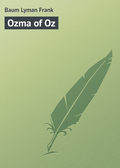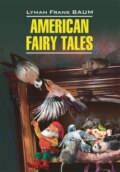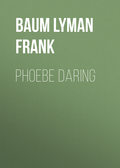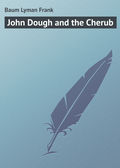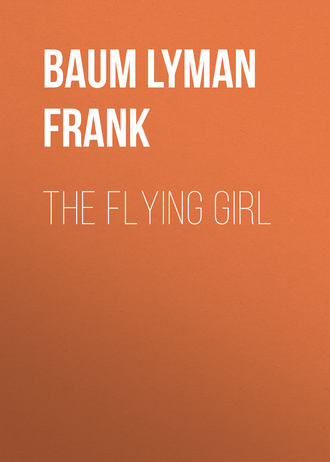
Лаймен Фрэнк Баум
The Flying Girl
CHAPTER XVI
THE OPENING GUN
Sybil rode with her father into town. On the way she said:
“You puzzle me. One would imagine you are playing fair with the Kanes.”
“Mere imagination,” he returned, gruffly.
“Yes,” she agreed; “your nature is to plot and intrigue. The deeper, the more stealthy and unsuspected the plot, the more characteristic is it of my subtle parent.”
“True,” he said.
“But here is a condition that puzzles me, as I have remarked. I understand how you won the confidence of the Kanes by posing as generous and unselfish. That was quite like you. But to-day you had them in your power. You might have demanded anything – everything – yet you accepted a mere ten per cent. Now I’m really wondering what your game is.”
It was evident he did not relish his daughter’s criticism, for his usually placid brow bore a heavy frown. Still, he answered lightly:
“You’re stirring too deep; you’re roiling the pot. Why don’t you look on the surface?”
“Oh! how stupid of me,” she said in a relieved voice.
“To be a diverse scoundrel,” announced her father, “is the acme of diabolic art. From complication to simplicity is but a step, yet requires audacity. Most rascals fail to realize that an honest act, by way of contrast, affords more satisfaction than persistent chicanery will produce. We must have variety in our pleasures in order to get the most from them.”
“To be sure,” said Sybil.
“Meantime, you are forgetting your Uncle Burthon.”
They rode in silence for a time. Then the girl nestled a little closer to her father’s side and murmured:
“I’m mighty glad, Daddy. I like the Kanes.”
“So do I,” he responded.
“And isn’t Stephen’s aëroplane marvelous?”
“I consider it,” said he, “the cleverest and most important invention of the age.”
By eight o’clock a skillful photographer was on his way to Stephen Kane’s hangar to get pictures of the aircraft, while Mr. Cumberford sat in the office of a noted advertising expert and bargained for an amount of publicity that fairly made the man’s head swim. The city editors of all the morning papers were next interviewed and interested in the Cumberford campaign, so that half a dozen reporters who were noted for their brilliant descriptive writing attended a luncheon given by Mr. Cumberford at the Aëro Club and listened to his glowing accounts of the Kane Aircraft and the wonderful flight made by its inventor that very morning.
For fear Mr. Burthon might drop into the Club during this session, the cautious “manager” of the aircraft had taken the precaution to have Brewster telephone him to come to the South Pasadena workshop, and to keep him there by some pretext till late in the day. This was done. Mr. Burthon spent the entire afternoon with his imitation aircraft, returning to Los Angeles for a late dinner at his club. Then, being very tired, he went early to bed.
At breakfast next morning he picked up a newspaper, started as his eye fell upon the lurid headlines, and nearly fainted with chagrin and anger.
Upon the first page was a large picture of the Kane Aircraft, with a vignette of its inventor in an upper corner and columns of description and enthusiastic comment regarding his creation, which was heralded as a distinct forward stride in practical aviation. Stephen’s remarkable flight was referred to and promise made of an exhibition soon to be held at Dominguez Field where the public would be given an opportunity to see the aircraft in action.
Mr. Burthon, as soon as he could recover himself, read every word carefully. Then he smoked his cigar and thought it over. Half an hour later he was making the rounds of the evening papers, but found he was unable to “kill” the articles prepared to exploit the Kane Aircraft. The morning papers having devoted so much space to the subject, the afternoon papers could not possibly ignore it, and finding he was helpless in this attempt he followed another tack.
Entering the office of the secretary of the Aëro Club he said:
“I believe our contract with the owners of Dominguez Field provides that the Aëro Club may have the use of the grounds whenever it so desires, regardless of any other engagements by outsiders.”
“Certainly,” replied the secretary. “I remember you yourself insisted upon that condition, as chairman of the committee on arrangements.”
“Please notify the manager that we require Dominguez Field, for Club purposes, every day for the next two weeks.”
“But – Mr. Burthon! Think of the expense.”
“I shall personally pay all charges.”
“Very well.”
The secretary telephoned, and was informed that the Field had been engaged that morning for the coming Saturday by a Mr. Cumberford, an Aëro Club member. But Mr. Burthon insisted on the rights of the Club, as an organization, and the manager agreed to cancel Cumberford’s engagement.
From there Mr. Burthon went to the managers of the Motordrome, the baseball parks and Luna, engaging every open date for two weeks to come. Then having practically tied up every available place where the Kane Aircraft might be publicly exhibited, he sighed contentedly and went to his South Pasadena workshop to hasten the completion of his own aëroplane.
Mr. Cumberford was annoyed when he received notice that he could not have Dominguez Field for any day previous to the aviation meet. He was further annoyed by the discovery that Burthon had engaged every public amusement park in the vicinity of Los Angeles. But he was not the man to despair in such an emergency; the contest between him and his hated brother-in-law merely sharpened his wits and rendered him more alert.
He found a broad vacant field on the Santa Monica car line; arranged with the street railway company to carry the people there for a five cent fare, and tied up his deals with contracts so that Burthon would be unable to interfere. Then he ordered a large grand stand to be built and instead of fencing in the grounds determined to make the exhibition absolutely free to all who cared to attend.
These arrangements completed, Mr. Cumberford announced in glaring advertisements the date of the exhibition, and decided he had won the game.
Mr. Burthon tried to enjoin the exhibition, claiming that Stephen Kane’s aircraft was an infringement on his own device; but Stephen personally appeared before the judge and convinced him there was nothing in the assertion. Of course Mr. Cumberford saw that the newspapers had full accounts of these proceedings, and so public interest was keyed up to the highest pitch when Saturday arrived. The cars on that day were taxed to their fullest capacity to carry the crowds to Kane Park, as the new aviation field was called.
A large and attractive hangar had been constructed on the field, and Stephen, on the morning of the exhibition, flew his aëroplane from Marston’s pasture to Kane Park, alighting successfully just before the hangar. Orissa, Sybil and Mr. Cumberford were there to receive him, and after placing the aircraft safely in the new hangar they all motored to town for breakfast at the Alexandria.
It was no longer possible for Steve to take entire personal charge of his invention, so Mr. Cumberford, having made a careful search, was finally able to secure two men, who until that time had been strangers to one another, as assistants. These men were skilled mechanics and recommended as honest and reliable – which perhaps they were under ordinary circumstances. Their names were Wilson and Reed. As they had already been two days in Stephen’s workshop and were now thoroughly conversant with their duties, these two men were left at the hangar in charge of the aëroplane, with instructions to watch it carefully and allow no one to enter or to examine it.
Steve needed rest, for he had worked night and day preparing for this important public test. The exhibition was to be held at two o’clock, so he reluctantly acceded to Mr. Cumberford’s request that he lie down in a quiet room at the hotel and sleep until he was called to lunch.
CHAPTER XVII
A CURIOUS ACCIDENT
Orissa had not been at all nervous over the event at Kane Park until the hour when she entered the field and noted the tremendous throng assembled to witness her brother’s much heralded flight. The band was playing vigorously and many gay banners waved over the grand stand and the big hangar wherein the aircraft was hidden. Then, indeed, she began to realize the importance of the occasion, and her heart throbbed with pride to think that Steve was the hero all awaited and that his name would be famous from this time forth.
This was the 17th of December, and on January first the great International Aviation Meet was to be held at Los Angeles, with such famous aviators present as the Wright Brothers, Glenn Curtiss, Hubert Latham, Arch Hoxsey, their old friend Willard, Parmalee, Ely, Brookins, Radley and many others. Mr. Cumberford had entered Stephen Kane for this important meet and the young man was booked to take part in the endurance and speed tests and to make an attempt to break the world’s record for altitude – all in his own flyer, the Kane Aircraft. So swift a transition from obscurity to popularity – or at least to the attention of the civilized world – was enough to turn the head of anyone; but as yet Steve seemed all unaware of his own importance.
Disregarding the crowds, which were eagerly seeking a glimpse of the young aviator but did not know him, he quietly made his way to the hangar and was admitted by Wilson, who guarded the doorway from an insistent group demanding a peep at the aëroplane.
Steve took off his coat, made a thorough inspection of all the working parts, and then put on his close-fitting cap and goggles, buttoned a sweater over his chest and nodded to his men to throw back the entrance curtains.
Two policemen cleared the way and as the aviator drew back his lever the aircraft rolled out of the hangar into full view of the multitude. A shout went up; handkerchiefs were waved and the band played frantically. On its big wheels, which were almost large enough for a motor car, the aëroplane sped across the field, turned, passed the grand stand, and with accelerating speed dashed away to the farther end of the field.
A murmur arose, in which surprise and disappointment were intermingled. One fat gentleman, who had been patiently waiting for two hours, exclaimed: “Why, it’s only a sort of automobile, with crossed airplanes set over it! I thought they claimed the thing could fly.” Those who knew something of aviation, however, were the ones astonished at Steve’s preliminary performance. They realized the advantage of being able to drive an aëroplane on its own wheels, as an automobile goes, in case of emergencies, and moreover the “crossed planes” – a distinct innovation in construction – gave them considerable food for thought. Usually the two surfaces, or floats, of a biplane are exactly parallel, one above the other; but in Steve’s machine the upper plane ran fore and aft, while the lower one extended sidewise. At a glance it was possible to see the advantage of this arrangement as a duplex balance, which, with the swinging wing-ends, comprised the safety device that the inventor believed made his aëroplane superior to any other.
From the far end of the field Steve swung around and started back, straight for the grand stand. He had nearly reached it when he threw in the clutch that started the propellers and at the same time slightly elevated the front rudder. Up, like a bird taking wing, rose the aircraft, soaring above the grand stand and then describing a series of circles over the field. Gradually it ascended, as if the aviator was ascending an aërial spiral staircase, until he had mounted so far among the clouds that only a grayish speck was discernible.
The spectators held their breaths in anxious suspense. The speck grew larger. Swooping down at a sharp angle the aircraft came suddenly into view and within a hundred feet of the ground resumed its normal position and began to circle around the field again.
Now a mighty cheer went up, and Orissa, who had been pressing Sybil’s hand with a grip that made her wince, found herself sobbing with joy. Her brother’s former flights had been almost as successful as this; but only now, with the plaudits of a multitude ringing in her ears, did she realize the wonderful thing he had accomplished.
But on a sudden the shout was stilled. A startled, frightened moan ran through the assemblage. Women screamed, men paled and more than one onlooker turned sick and faint.
For the Kane Aircraft, while gracefully gliding along, in full view of all, was seen to suddenly collapse and crumple like a pricked toy balloon. Aëroplane and aviator fell together in a shapeless mass toward the earth, and the sight was enough to dismay the stoutest heart.
But Steve’s salvation lay in his altitude at the time of the accident. Fifty feet from the earth the automatic planes asserted their surfaces against the air and arrested, to an appreciable extent, the plunge. Had it been a hundred feet instead of fifty the young man might have escaped without injury, but the damaged machine had acquired so great a momentum that it landed with a shock that unseated young Kane and threw him underneath the weight of the motor and gasoline tank.
A dozen ready hands promptly released him from the wreck, but when they tried to lift him to his feet he could not stand. His leg was broken.
CHAPTER XVIII
THE ONE TO BLAME
Mr. Cumberford locked the doors of the hangar and refused to admit anyone but his own daughter. Even Reed and Wilson, having assisted to drag the wreck to its shed, were ordered peremptorily to keep out. Wilson obeyed without protest, but Reed was angry and said it was his duty to put the aircraft into shape again. Cumberford listened to him quietly; listened to his declaration that he had had nothing to do with the construction of the aëroplane and therefore could in no way be held responsible for the accident; and after the man had had his say his employer asked him to come to his hotel in the evening to consider what should be done. He also made an appointment with Wilson. Then he shut himself up in the hangar with Sybil.
Orissa had gone with Steve in the ambulance to the hospital, where she remained by his side until the leg was set and the young man felt fairly comfortable. The injury was not very painful, but Steve was in great mental distress because his accident would prevent his taking part in the aviation meet. All their carefully made plans for the successful promotion of the Kane Aircraft were rendered futile by this sudden reverse of fortune, and the youthful inventor constantly bewailed the fact that Burthon would now have a clear field and his own career be ignominiously ended.
Orissa had little to say in reply, for her own heart was aching and she saw no way to comfort her brother. When he was settled in his little white room, with a skillful nurse in attendance, the girl went home to break the sad news to their blind mother.
Meantime Mr. Cumberford was busy at the hangar. In spite of his usual nonchalance and obtuse manner – both carefully assumed – the man had a thorough understanding of mechanics and by this time knew every detail of young Kane’s aëroplane quite intimately. Also, he was a shrewd and logical reasoner, and well knew the accident had been due to some cause other than faulty parts or inherent weakness of the aircraft. So he took off his coat, rolled up his shirt sleeves and began a careful examination of the wreck.
It was Sybil, however, who stood staring at the aëroplane, always fascinating to her, who first discovered the cause of Steve’s catastrophe.
“See here, Daddy,” she exclaimed; “this guy-wire has been cut half through, in some way, and others are broken entirely.”
Mr. Cumberford came to her side and inspected the guy-wire. The girl was right. It was certainly odd that several strands of the slender but strong woven-wire cable had parted. Her father took a small magnifying glass from his pocket and examined the cut with care.
“It has been filed,” he announced.
Sybil nodded, but she seemed absent-minded and to have lost interest in the discovery.
“From the first I suspected the guy-wires,” she said. “When the aircraft collapsed I knew the wires had parted, and then – I thought of my clever uncle.”
Mr. Cumberford rolled down his sleeves and put on his coat.
“Three of the wires gave way,” he observed, “and it’s a wonder young Kane wasn’t killed. Come, ’Bil; we’ll go back to the hotel.”
They found the field deserted, their motor car being the last on the grounds. During the ride into town Sybil remarked:
“This affair will cause you serious loss, Daddy.”
“Why?”
“Steve can’t exhibit his device at the meet, and Uncle Burthon will be on hand to win all the laurels.”
“Don’t worry over that,” he said grimly. “We’ve ten days in which to outwit Burthon, and if I can’t manage to do it in that time I deserve to lose my money.”
Wilson came to the hotel promptly at eight o’clock for his interview with Mr. Cumberford. Said that gentleman:
“Tell me all that happened at the hangar after we left you and Reed there this morning.”
The man seemed reluctant at first, but finally decided to tell the truth. He appeared to be an honest young fellow, but knew quite well that his testimony would injure his fellow assistant.
“It was quite early, sir, when an automobile came into the field and a gentleman asked to see the aircraft. Mr. Reed was at the door, at the time, and I heard him reply that no one could be admitted. Then the gentleman said something to him in a low voice and Reed, after a little hesitation, turned to me and told me to guard the door. I did so, and the two walked away together. I saw them in close conversation for quite a while, and then Reed came back to the hangar and said: ‘The gentleman is having trouble with his motor car, Wilson, and one of his engines is working badly. You understand such things; go and see if you can help him, while I guard the door.’
“I thought that was queer, sir, for Reed is as good a mechanic as I am; but I took a wrench and walked over to the automobile, which was not a hundred yards distant. A little dried-up chauffeur was in the driver’s seat. The gentleman asked me to test the engines, which I did, and found there was nothing wrong with them at all. I hadn’t been a bit suspicious until then, but this set me thinking and I hurried back to the hangar. I hadn’t been away ten minutes, and I found Reed standing in the doorway quietly smoking his pipe. Everything about the aircraft seemed all right, so I said nothing to Reed except that his friend was a ringer and up to some trick. He answered that the man was no friend of his; that he had never seen him before and was not likely to see him again. That is all, sir. I didn’t leave the hangar again until Mr. Kane returned and took charge of it.”
Mr. Cumberford had listened intently.
“Do you know the name of the man with the automobile?” he asked.
“No, sir.”
“Describe him, please.”
Wilson described Burthon with fair accuracy.
“Thank you. You may go now, but I want you on hand to-morrow morning to assist in getting the machine back to Kane’s old hangar.”
“Very well, sir.”
Reed came a half hour after Wilson had left. His attitude was swaggering and defiant. Mr. Cumberford said to him:
“Reed, your action in filing the guy-wires is a crime that will be classed as attempted manslaughter. You are liable to imprisonment for life.”
The man grew pale, but recovering himself replied:
“I didn’t file the wires. You can’t prove it.”
“I’m going to try, anyway,” declared Cumberford. “That is, unless you confess the truth, in which case I’ll prosecute Burthon instead of you.”
Reed stared at him but, stubbornly made no reply.
“How much did he pay you for the work?” continued Cumberford.
No answer.
Mr. Cumberford touched a bell and a detective entered.
“Officer, I accuse this man of an attempt to murder Stephen Kane,” said he. “You overheard the recent interview in this room and understand the case perfectly and the evidence on which I base my charge. You will arrest Mr. Reed, if you please.”
The officer took the man in charge. Reed was nervous and evidently terrified, but maintained a stubborn silence.
“Confession may save you,” suggested Cumberford; but Reed was pursuing some plan previously determined on, and would not speak. So the officer led him away.
Next morning the wrecked aëroplane was transferred to the workshop in the Kane garden, where Wilson, under the supervision of Orissa and Mr. Cumberford, began taking it apart that they might estimate the damage it had sustained. Orissa’s face bore a serious but determined expression and she directed the work as intelligently as Steve could have done. Cumberford, who had brought a pair of overalls, worked beside Wilson and in a few hours they were able to tell exactly what repairs were necessary.
“The motors are not much injured,” announced Orissa, “and that is indeed fortunate. We need one new propeller blade, five bows and struts for the lower plane, new wing ends and guy-wires and almost a complete new running gear. It isn’t so very bad, sir. With the extra parts we have on hand I believe the aircraft can be put in perfect condition before the meet.”
“Good!” exclaimed Mr. Cumberford. “Then our greatest need is to secure a competent aviator.”
“To operate Stephen’s machine?”
“Of course. He’s out of commission, poor lad; but the machine must fly, nevertheless.”
Orissa’s blue eyes regarded him gravely. She had been considering this proposition ever since the accident.
“Our first task,” said she, “is to get my brother’s invention thoroughly repaired.”
“But the question of the aviator is fully as important,” persisted her friend. “Wilson,” turning to the mechanic, “do you think you could operate the aircraft?”
“Me, sir?” replied the man, with a startled look; “I – I’m afraid not. I understand it, of course; but I’ve had no experience.”
“No one but Stephen Kane can claim to have had experience with this device,” said Mr. Cumberford; “so someone must operate it who is, as yet, wholly inexperienced.”
“Can’t you find an aviator who has used other machines, sir?” asked Wilson. “The city is full of them just now.”
“I’ll try,” was the answer.
Mr. Cumberford did try. After engaging another mechanic to assist Wilson he interviewed every aviator he could find in Los Angeles. But all with the slightest experience in aërial navigation were engaged by the various aëroplane manufacturers to operate their devices, or had foreign machines of their own which were entered for competition. He was referred to several ambitious and fearless men who would willingly undertake to fly the Kane invention, but he feared to trust them with so important a duty.
Returning one day in a rather discouraged mood to Orissa, who was busy directing her men, he said:
“I have always, until now, been able to find a man for any purpose I required; but the art of flying is in its infancy and the few bold spirits who have entered the game are all tied up and unavailable. It looks very much as if we were going to have a winning aëroplane with no one to develop its possibilities.”
Orissa was tightening a turnbuckle. She looked up and said with a smile:
“The aviator is already provided, sir.”
“What! You have found him?” exclaimed Mr. Cumberford.
“I ought to have said ‘aviatress,’ I suppose,” laughed the girl.
“My daughter? Nonsense.”
“Oh, Sybil would undertake it, if I’d let her,” replied Orissa. “But I dare not trust anyone but – myself. There is too much at stake.”
“You!”
“Just Orissa Kane. I’ve been to the hospital this morning and talked with Steve, and he quite approves my idea.”
Mr. Cumberford looked at the slight, delicate form with an expression of wonder. The girl seemed so dainty, so beautiful, so very feminine and youthful, that her suggestion to risk her life in an airship was positively absurd.
“You’ve a fine nerve, my child,” he remarked, with a sigh, “and I’ve no doubt you would undertake the thing if I’d give my consent. But of course I can’t do that.”
“Why not?”
“You’re not fit.”
“In what way?”
“Why, er – strength, and – and experience. Girls don’t fly, my dear; they simply encourage the men to risk their necks.”
“Boo! there’s no danger,” asserted Orissa, scornfully. “One is as safe in the Kane Aircraft as in a trundle-bed.”
“Yet Steve – ”
“Oh, one may be murdered in bed, you know, as well as in an aëroplane. Had those guy-wires not been tampered with an accident to my brother would have been impossible. Have you stopped to consider, sir, that even when the planes separated and crumpled under the air pressure Steve’s device asserted its ability to float, and dropped gently to the ground? Steve managed to get hurt because he fell under the weight of the motors; that was all. Really, sir, I can’t imagine anything safer than the aircraft. And as for brawn and muscle, you know very well that little strength is required in an aviator. Skill is called for; a clear head and a quick eye; and these qualities I possess.”
“H-m. You think you can manage the thing?”
“I know it – absolutely. I’ve talked over with Steve every detail from the very beginning, and have personally tested all the working parts time and again, except in actual flight.”
“And you’re not afraid?”
“Not in the least.”
“You won’t faint when you find yourself among the clouds?”
“Not a faint, sir. It isn’t in me.”
Mr. Cumberford fell silent and solemn. He began to seriously consider the proposition.



